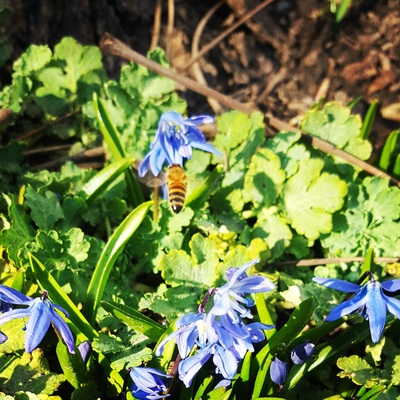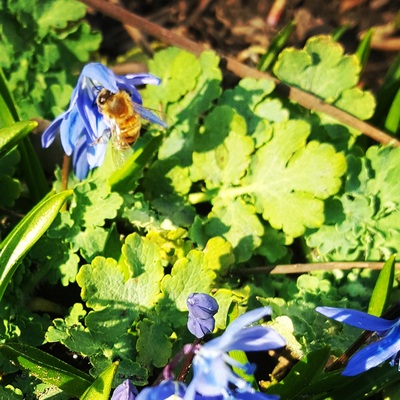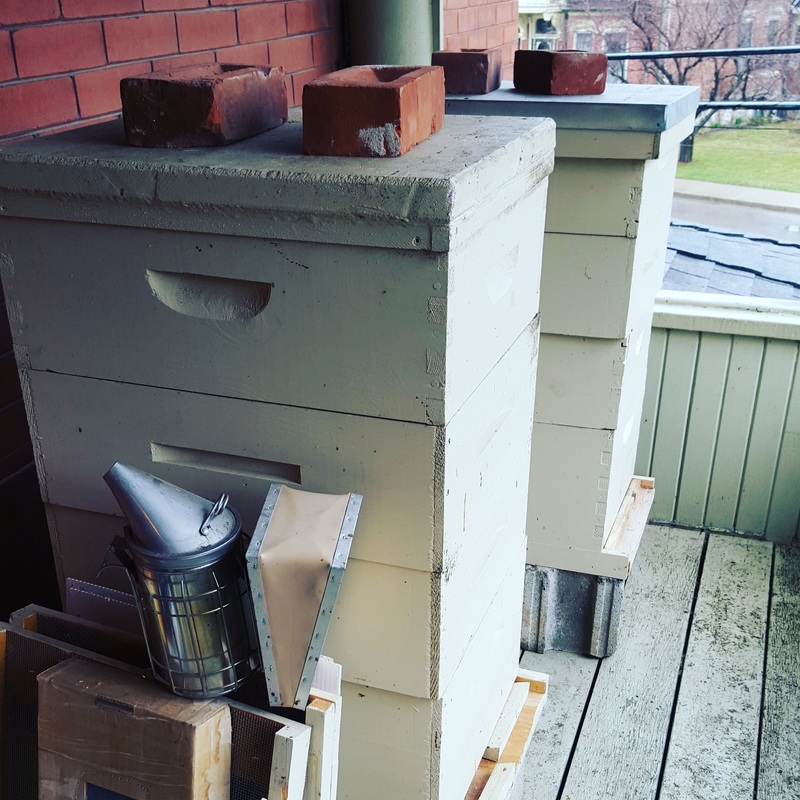|
I have never seen one of my bees in our backyard. People often ask me how I can have two beehives on our porch and not worry about the kids being stung while they are at play in the yard. And I always repeat that I have never seen even one of my bees in our backyard. We have bumblebees and wasps and yellow jackets, but never do I see my honeybees buzzing about my garden. This week, on one of the warmer days, Henry and I crouched to watch a couple of honeybees gathering nectar from the few tiny blue flowers at the back end of my garden. They were beautiful to watch, but they were not my honeybees. Before you think I have extraordinary bee-identifying skills, let me explain. I know they weren’t my sweet girls because all my honeybees died two weeks ago. It’s taken me this long to be ready to share that news with you. I could never farm something I would have to kill. I just don’t have it in me. The loss of these hives has just been so sad because I feel responsible. Last night I had the opportunity to share about my adventures in apiculture at the Paris Lectures here in town, but I really wasn't ready to share the sad parts with a room full of people curious to hear about the wonderful world of beekeeping. So I kept it positive and upbeat even though I am feeling a bit disheartened about it all. Let me tell you what I think happened.... The girls came out of their hives very early this spring. Those ridiculously warm days in February got them up and out. They were very, very busy with their spring cleaning. They dragged out their dead and cleaned up the hive. The queen got busy laying. Foragers went off in search of food. They were all very gung ho, because it seemed that spring had arrived. I was thrilled to see that they had survived the winter. With most beekeepers reporting winter losses of 35-38% of hives these days, having both hives survive was a major victory for this amateur apiculturist. Then at the beekeepers’ meeting we attended recently, the one speaker casually reminded everyone to feed their bees because ‘this is the time of year when they starve to death’ due to early spring temperatures. My heart sank and I looked at my dad. I hadn’t seen the bees buzzing around the hive in several days. I knew we had left them plenty of honey to last the winter, hadn’t we? The next morning Henry and I took a drive to Burgessville to pick up some pollen patties from the beekeepers supply store there. Once home again, I rushed upstairs, geared up, fired up the smoker, opened up the hives and – nothing. No movement at all. And no honey at all. Just two hives filled with dead bees who had eaten everything they had stored and couldn’t find any more food outside with which to replenish their stores and their stomachs. Spring temperatures came too early and spring flowers and nectar did not. So, I did the sad work of cleaning out the hives with the shop vac. For once, I took the hood off my beekeeper’s suit and worked without gloves because I didn’t need protection. No one was going to sting me. The smoker slowly burned itself out. I sucked the bees from the hives while taking care to preserve the beautifully drawn comb so that the next tenants will be able to hit the ground running, able to fill honeycomb instead of having to build it. The next bees will also be spared the task of dragging out the dead and cleaning out the hive. I know they can do it, and would do it within a few days, but again, I’d like to spare them the task and let them get down to work doing what they do best – gathering the ingredients for their amazing honey. For now, everything is clean and tidy and a bit like a ghost-town up on the porch. Out of habit I keep looking out our bedroom window to see what my girls are up to, but there’s nothing going on. We will have to wait until May to put new nucs into the old hives. A nucleus is a four-frame mini-hive that you purchase. It has a queen and a small entourage and someone else has taken the time to nurture them to that point. They cost between $150 and $200, so it’s no small thing to lose your hives and have to replace them with new colonies. I had already ordered twenty new hives for our grand expansion, so I added another two nucs to the order. Next year, we will have enough hives that we will be able to split our own colonies to replace any hives that don’t survive the winter. And next year, we will know to feed those girls when they first come out into the spring sunshine. Another lesson learned.
3 Comments
Yvonne Lui
3/31/2016 08:07:38 pm
Kari,
Reply
Karen W
3/31/2016 08:44:42 pm
😞💧🐝 So sorry to hear that. You were so Brave last night! Some lessons are particularly difficult.
Reply
Mary Anne
4/1/2016 10:03:48 am
My heart aches for you and Henry and your honey bees. I was thinking about you and wondering how your three minutes of sharing time went. Great that you went ahead with it. What an apiculturist trouper you are !!!!
Reply
Leave a Reply. |
Kari Raymer BishopLover of Jesus, cheeses and tropical breezes... seeking balance in life, even as I embrace new challenges and chase new dreams. I am wife, mother, daughter and friend, as well as teacher, entrepreneur, activist, writer, beekeeper and hostess. Come along on the journey through my long-awaited midlife crisis! Archives
March 2018
Categories |





 RSS Feed
RSS Feed